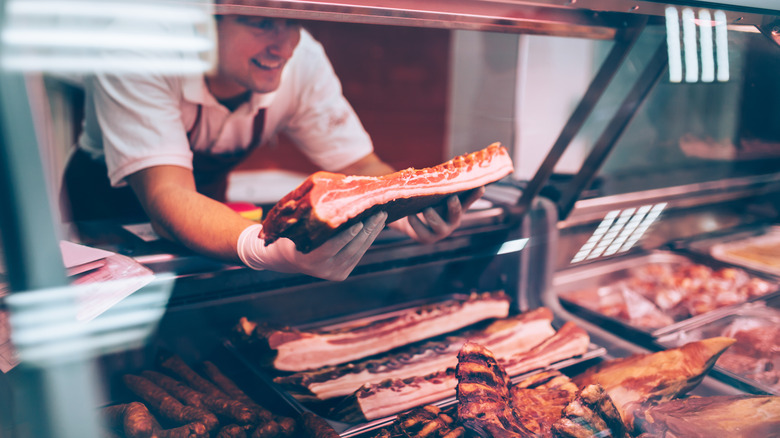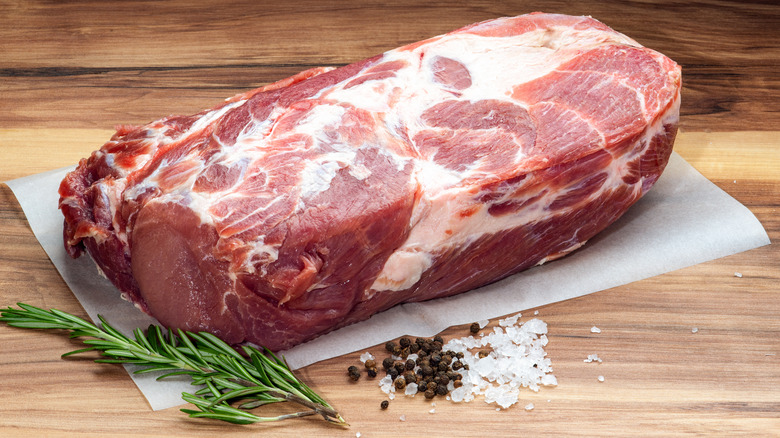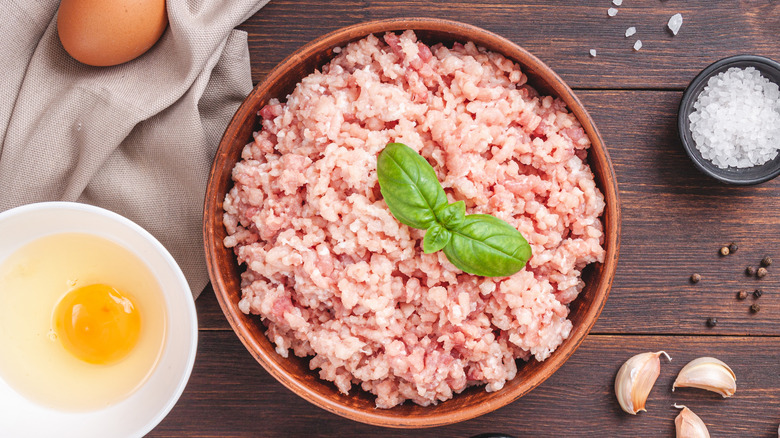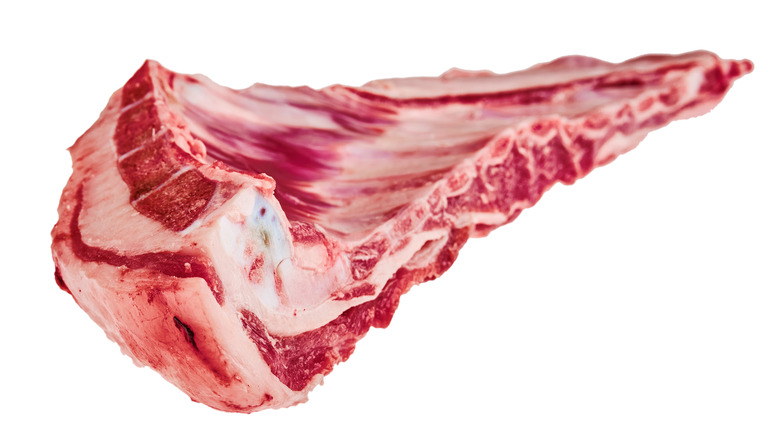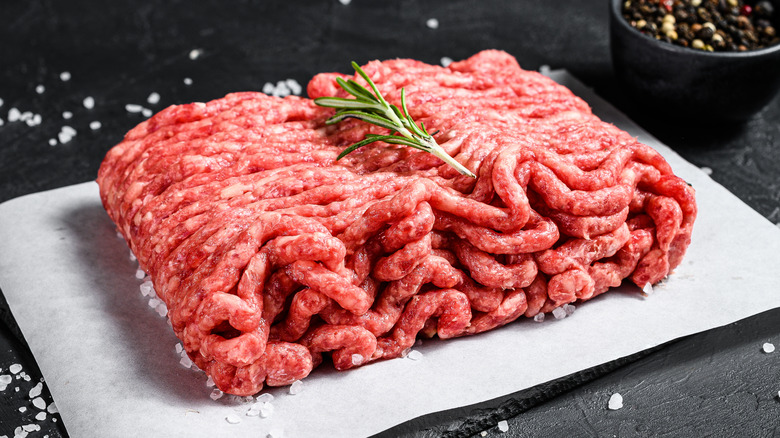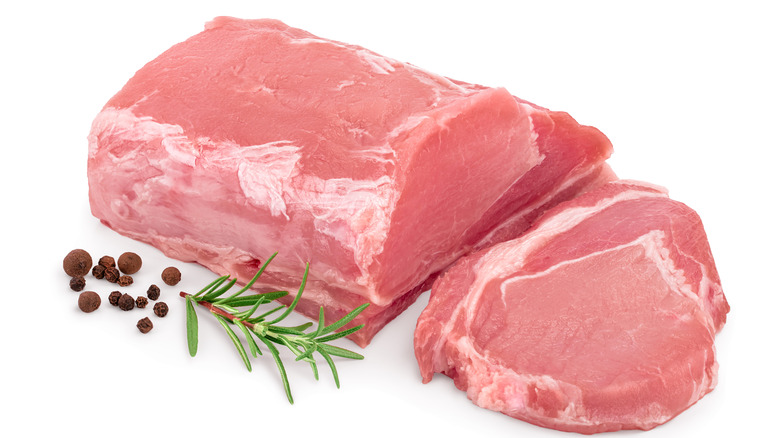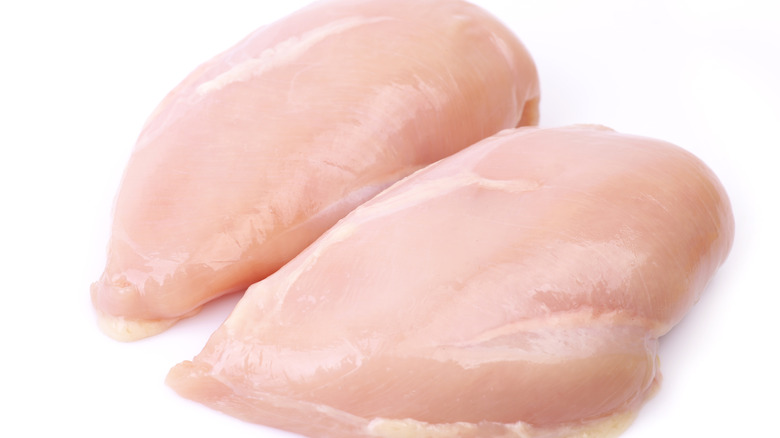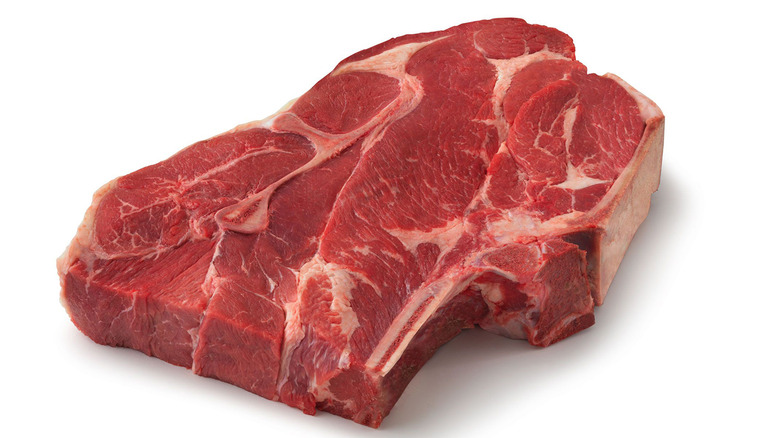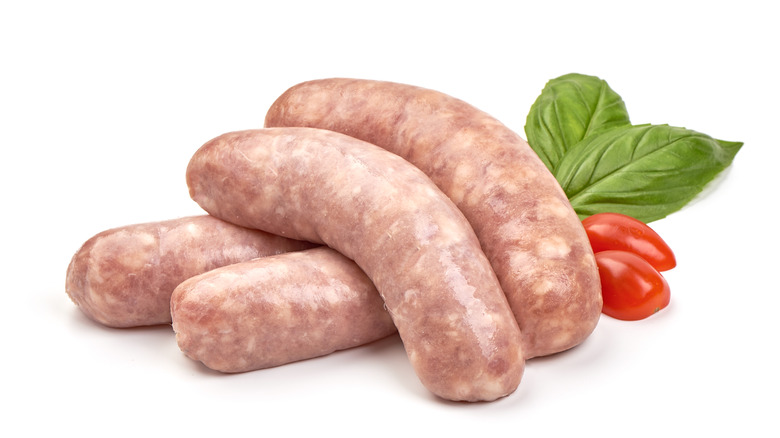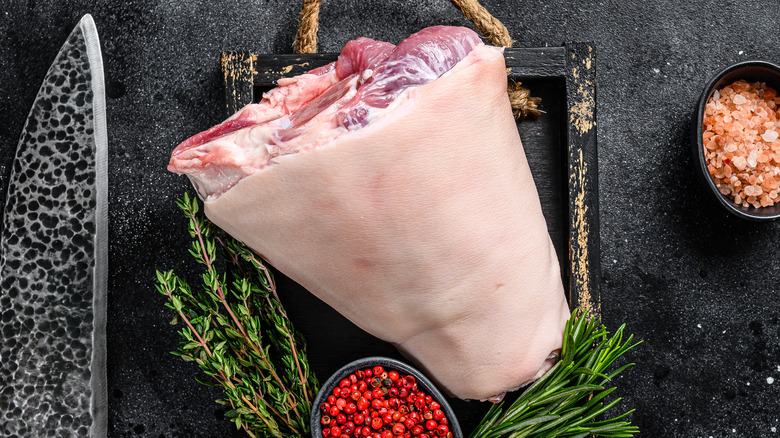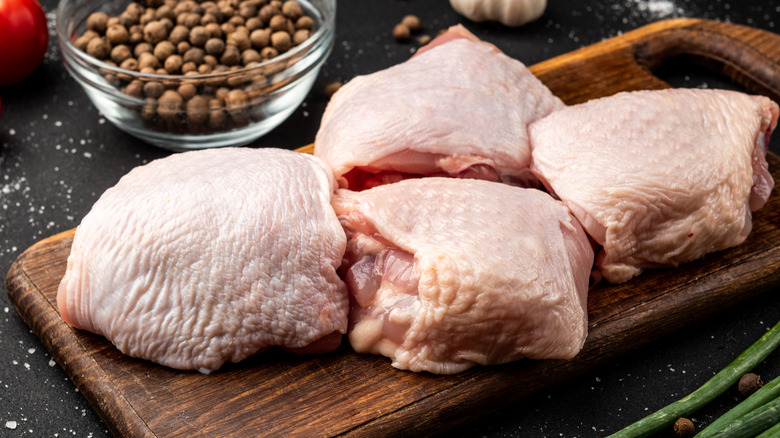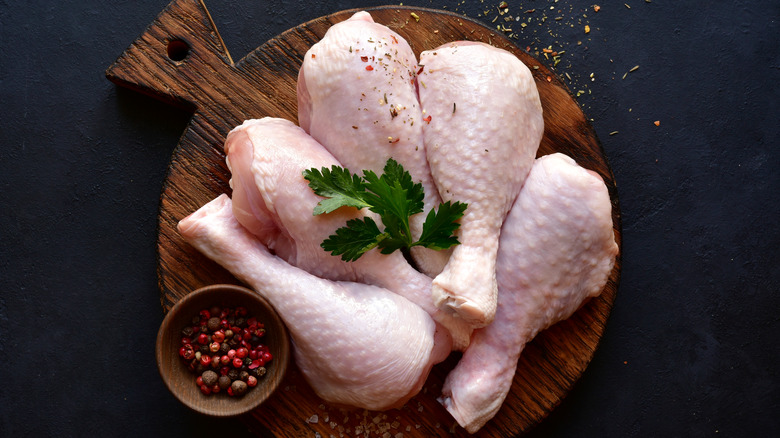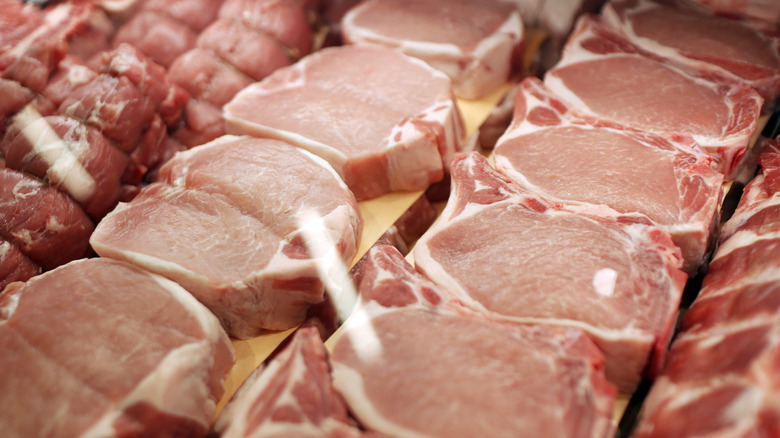Cheap Meats You Should And Shouldn't Buy
With the price of groceries on a continuous rise, you may be looking to save a bit of money at the supermarket. Meat can quickly get pricey, and it's a good time to search for cheaper alternatives to the meats you normally buy. The good news is that even in these expensive times, there are still plenty of good deals to be found at the meat counter if you know what to buy. Cheap cuts often need a little more cooking time to be edible, but when prepared the right way they can rival the most expensive meat at the butcher shop.
All the same, that doesn't mean that all cheap meat is a good idea. Some cheap cuts of meat aren't really worth buying at all (at least if you like flavor and tenderness). Other types of meat can be good if you opt for high quality but are downright horrifying if you buy the cheapest brands. Don't worry; with the guidance from this list, you'll know exactly what cheap meats you should and shouldn't buy. The prices we quote in this article come from our local area, so keep in mind you may find slight variations where you live.
Should: Pork butt/shoulder
Pork shoulder is usually separated into a couple of different cuts. Lower down close to the leg, you'll find something that's sold as either a picnic roast or a pork shoulder. Farther up is a slightly richer and fattier cut called (confusingly) the butt (via MyRecipes). According to The Spruce Eats, while there are some minor differences in the meat from these two shoulder cuts, in practical terms, you can almost always substitute one for the other.
Whether you end up buying a picnic roast or a butt, these cuts reward time, love, and attention in the kitchen. If you cook pork shoulder via any low and slow method, you'll end up eating the juiciest, tenderest, most flavorful pork you could possibly imagine. For example, our awesome pulled pork recipe turns pork butt into flavorful shreds of goodness. If you want to speed things up a little bit, an Instant Pot is the perfect tool for making carnitas out of pork shoulder. You'll be glad to include pork shoulder in your repertoire as it is a cheap way to feed a crowd; you can pick it up at Walmart for about $2 a pound.
Shouldn't: Ground turkey
The headline of this Reddit thread says it all: "Why did no one tell me how gross ground turkey is?" While the thread does attract some ground turkey proponents, we tend to agree more with the haters. One declared, "It's pretty disgusting. Mealy tasting, bland, and funky." There's just something kind of off about the taste of ground turkey. It's a little bit gamy and it makes for a very dry, unappetizing burger. The best part about it is the price: It goes for just north of $3 a pound at Walmart.
Ground turkey's main selling point is that it's a healthier, leaner replacement for ground beef. While a lot of ground beef is certainly fattier than turkey, you can easily find beef that's just as low fat as turkey, if not even leaner. EatingWell broke it down and found out that 93/7 lean ground beef (that is, 93% lean and 7% fat) is nutritionally very similar to ground turkey. The beef actually contains slightly more protein and significantly more iron than turkey, so in some ways, it is actually healthier. Additionally, ground beef, even lean ground beef, has a delicious red meat flavor that turkey just can't replicate, no matter how hard it tries.
Should: Lamb breast
Lamb can be pretty pricey in American grocery stores. For example, lamb loin chops from H-E-B go for over $25 a pound. However, if you choose a less popular cut, you can score a delicious piece of lamb for a fraction of the price. Next time you're craving lamb, try the breast, which Simply Beef & Lamb explains actually comes from a lamb's belly. It's somewhat analogous to pork belly, but it can also come with the rib bones attached. Like pork belly, it's streaked with thick layers of fat, so it benefits from low and slow cooking to render out the fat and tenderize the meat.
Lamb breast has a strong flavor, and if handled correctly, is perhaps even more delicious and succulent than more-expensive chops. Walmart sells it for $4 a pound, which is an absolute steal for lamb. If you're the type of person who spends all summer smoking meat on the grill, why not try replacing the usual pork ribs or beef brisket with lamb breast?
Shouldn't: Pre-ground beef
When it comes to ground beef, we want to discourage you from buying the pre-packaged stuff that's sitting in your grocer's cold case. Although it is convenient and relatively affordable, it's not worth buying. For one, as Cook's Illustrated explains, regular ground beef is not particularly food-safe. That package of ground beef at your grocery store could very well be made from literally hundreds of individual cows. Each one of those cows could potentially have been mishandled or contaminated at some point.
Prepackaged ground beef also has a high chance of containing lean finely-textured beef, which ABC News famously dubbed "pink slime" (via The Counter). This beef product is made by taking the trimmings from slaughterhouses, grinding them into a slurry, separating out the fat, and then spraying the resulting lean beef matter with ammonia to hopefully kill bacteria.
Particularly if you like your burgers cooked rare or medium, it's much safer to pick out a whole piece of meat and have a butcher grind it to order. That way, you know it's all from the same cow. This also lets you choose which cut of meat you want and the degree that it is ground. Freshly-ground beef requires much less processing, which we prefer.
Should: Pork loin
You're going to see a lot of pork and chicken among the recommended items on this list. In terms of value, almost any cut from these animals beats all but the cheapest cuts of beef by a mile. Take pork loin: It's a tender, juicy cut that can be cooked in many different ways. It has just enough fat to give it flavor, but not enough that you need to slow-cook it to be palatable (via The Kitchn). You can buy it deboned for convenience or choose a bone-in loin roast that is basically a budget-friendly alternative to a rack of lamb or prime rib.
Any cut of beef that combines this much convenience and flavor is going to be at least a little bit expensive. Pork loin, on the other hand, is shockingly cheap. You can pick up a nicely-trimmed boneless loin roast from Safeway for around $4 a pound. If you're willing to eat around bones, a bone-in loin pork shoulder blade roast costs half that by weight. If you're a beef lover looking for meat deals, maybe it's time to reconsider the hog.
Shouldn't: Boneless, skinless chicken breast
As we've already covered, chicken breast is the most expensive cut of chicken. However, chicken is generally cheap, so even the priciest piece of chicken is relatively inexpensive, running around $3 a pound at Target. Just because something is cheap doesn't make it a good deal, though. Boneless, skinless chicken breast kind of sucks. And you don't have to take our word for it; Chrissy Teigen agrees with us. According to The Daily Meal, in a series of Tweets, she wrote that "chicken breast is extremely popular for being literally the worst part of a chicken," adding, "I dunno I just like moisture and stuff." According to Teigen, "the best breast is equal to the worst thigh," and we have to agree.
Boneless, skinless chicken breast is very low in fat which makes it particularly vulnerable to overcooking (via The Daily Beacon). Unfortunately, you can't cook chicken medium-rare unless you want to play a game of salmonella Russian roulette. That leaves very little margin for error between dangerous and dry. Other cuts of chicken have more fat, so they remain juicy and delicious when cooked to a safe temperature. Plus, they're also cheaper which makes it a win-win. Since the breast is the least delicious and most expensive part of a chicken, you're better off skipping it.
Should: Beef chuck
If you really want good beef for a reasonable price, it's best to forget about steaks. Great deals can be found in tougher, fattier cuts that need to be cooked for a long time in order to release their deliciousness. The good news is that these tough, load-bearing muscles are exceptionally beefy and flavorful. It's no secret that fat adds flavor.
For the perfect combination of taste and value, seek out beef chuck roast (via Fine Cooking). It comes from a cow's shoulder and shares many of the attributes of pork shoulder: It's flavorful, fatty, and loves being slow-cooked. Since we're talking about beef and not pork, it's still more expensive than most other meats on this list at around $7 per pound from Target. That's still not too bad, however, and the flavor is worth it. Try making our recipe for slow cooker pot roast if you want to taste just how deliciously meaty and tender chuck becomes when it is treated the right way.
Shouldn't: Sausage
Here is a sentence that may chill your spine: "A product like sausage may contain a limited amount of mechanically separated (species) that may contain bone particles." That comes from the USDA's official statement regarding whether bone pieces are allowed in sausage. Mechanically separated meat is made by shoving animal carcasses that have had most of the meat already removed through a "mechanical deboner" that scrapes the rest of the meat from the bones. This material is then ground into a paste by being pushed through sieves that also filter out most (but not all) of the remaining bone matter (via Meat Science). Ultimately, a large portion of mechanically separated meat is not muscle tissue, but instead, connective tissue, fat, and possibly skin.
Rest assured that high-quality sausage is probably not going to have any mechanically separated meat in it. According to Liz Earle, the cheapest sausages are more likely to contain unsavory ingredients. Sausages can make for a wonderful meal, but it's best to stay away from the bottom-shelf stuff if possible.
Should: Ham hocks
What part of an animal is a hock, exactly? According to The Pioneer Woman, hocks, which are sometimes sold as pork knuckles, are part of the pig's leg. In Germany, slow-roasted pork knuckle with crackling-crisp skin is a traditional meal during Oktoberfest. The ham hocks in American grocery stores are usually cured and smoked, which gives them a rich, bacon flavor.
The little bit of meat on a ham hock becomes meltingly tender if it's cooked for long enough, but the main appeal is its ability to make anything it's cooked with exceptionally flavorful. Boiled ham hocks produce a deep, intense pork stock, and they're the perfect cut for flavoring greens, beans, other vegetables, or soups. The salty, smoky, fatty taste of a ham hock can enliven even the blandest dish and turn it into something special. They're quite cheap as well, going for a little over $2 a pound at H-E-B.
Shouldn't: Hot dogs
Being a type of sausage, hot dogs are also liable to contain mechanically separated meat. However, as we've previously mentioned, the USDA banned mechanically separated beef for human consumption in 2004. If you spring for the fancy all-beef hot dogs, you can rest assured that no mechanical separation happened to the beef in your tube steak.
Beyond concerns about industrial meat processing practices, premium all-beef hot dogs simply taste better. In our ranking of grocery store hot dogs, the worst contender was Bar-S, a value brand made from chicken, pork, and turkey. Jennie-O turkey franks were almost as bad. You might spend a little more for an all-beef hot dog, but an expensive hot dog is still going to be a cheap piece of meat; an 8-pack of Nathan's Famous beef franks, our favorite hot dog, costs less than $5 at Walmart. Don't punish yourself by buying the cheapest hot dogs at the supermarket.
Should: Chicken thighs
Chicken thighs are everything that chicken breast is not. They are flavorful, fatty, and delicious. As Allrecipes explains, thighs are much more forgiving if you happen to overcook them. You won't be left with dry cardboard if you neglect to take them off the heat for a couple of minutes. They're way less bland than even the best chicken breast and they're cheaper too. If you're not down with skin and bones (though, in our humble opinion, you should be), you can easily buy boneless, skinless thighs at most supermarkets.
You can use a chicken thigh in pretty much any way you'd normally cook a breast, and you're guaranteed a tastier result. If you need a little inspiration to get you started, our list of chicken thigh recipes is filled with enough inspiration for weeks of chicken dinners. If you're worried about your health, rest assured that chicken thighs aren't really less healthy than chicken breasts. We now know that avoiding fats isn't necessarily the healthiest dietary choice you can make.
Shouldn't: Chicken nuggets
Chicken nuggets are another type of meat where it pays to spend a little bit extra for the nicer brands. In our ranking of store-bought chicken nuggets, the generic store brands from Target, Walmart, and Sam's Club all fell toward the bottom of the list. In terms of pure horror, Walmart nuggets were the worst offenders. Reviewers on the Walmart site found a variety of foreign objects in their nuggets, including large bone fragments, feathers, and possibly pieces of plastic. Reviewers who didn't get stabbed by their nuggets reported an off-putting rubbery texture and deficiencies in the breading.
Compare that with our winning nugget, Tyson Fun Nuggets, and the difference is stark. The Fun Nuggets have an almost five-star average review, and customers rave about their taste and texture. As a bonus, they also look like dinosaurs. They cost $0.22 an ounce as opposed to the Walmart brand's $0.13 an ounce, but we would happily pay that to avoid bones and feathers.
Should: Drumsticks
Chicken thighs have had something of a renaissance lately, increasing dramatically in popularity over the last several years. The other section of a chicken's leg — the drumstick — has not achieved the same level of renown. Indeed, even as American culture has realized that dark meat chicken is worth buying, drumsticks have actually gotten less popular (via Taste). Clearly, we're all aboard the thigh bandwagon, but we're not exactly sure why the rising dark meat tide failed to lift the drumstick's boat.
Drumsticks have many of the same advantages as thighs. Their generous levels of skin, bone, and fat give them a strong, rich chicken flavor, and they're difficult to overcook. Drumsticks are also any easy piece of bone-in chicken to eat, as they have only one large bone. They're super cheap as well, selling for under $2 a pound at Kroger. Why not try picking up a pack of them and testing out this ingenious TikTok drumstick hack?
Shouldn't: Boneless pork chops
Pork is generally guaranteed to be fatty and juicy, which makes dry pork chops especially disappointing. While any kind of pork chop can dry out if you cook it for too long, the worst offenders are boneless loin chops. As HuffPost explains, the number one way to prevent the tragedy of a tough, leathery pork chop is to select the right kind of meat. The best pork chops are sold on the bone and should have a decent amount of fat attached to them. The bone helps protect the meat from overcooking, and the fat will melt as the chops cook and make them juicier.
Boneless loin chops set you up for failure. Just look at the product image for them at Target. There's hardly a scrap of fat to be found. While that might appeal to people who think of pork as the other white meat, for us, it's a serious turnoff. You might as well buy chicken breast at that point.
